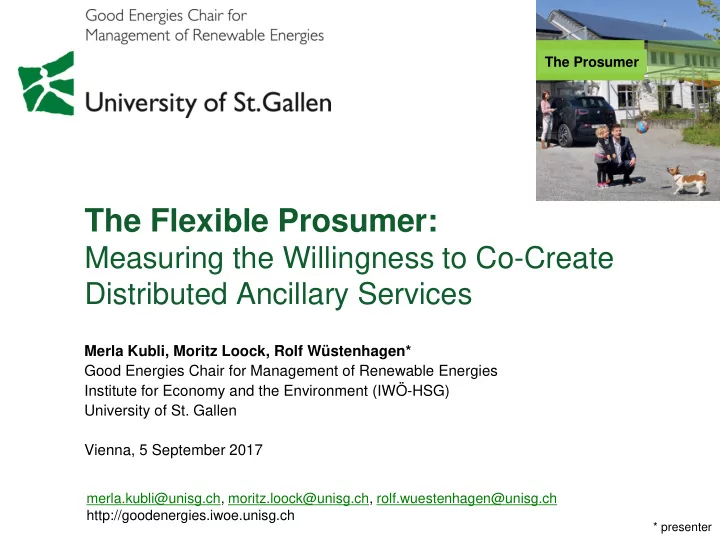

The Prosumer The Flexible Prosumer: Measuring the Willingness to Co-Create Distributed Ancillary Services Merla Kubli, Moritz Loock, Rolf Wüstenhagen* Good Energies Chair for Management of Renewable Energies Institute for Economy and the Environment (IWÖ-HSG) University of St. Gallen Vienna, 5 September 2017 merla.kubli@unisg.ch, moritz.loock@unisg.ch, rolf.wuestenhagen@unisg.ch http://goodenergies.iwoe.unisg.ch * presenter
2 Outline 1. Background and Problem 2. Research Questions 3. Data and Methods 4. Results 5. Discussion
3 Strong growth in fluctuating renewables leads to search for new forms of flexibility 12000 10% Solar 17 GW (22%) 10000 Installed PV Capacity in Bavaria [MW] Wind 25 GW (33%) 8000 6000 4000 2000 0.1%* 0 http://www.energieatlas.bayern.de/thema_sonne/photovoltaik/daten.html Germany, August 2015: >50% of electricity from PV & wind in certain hours *) Per cent of Bavarian power supply http://www.agora-energiewende.de/en/topics/-agothem-/Produkt/produkt/76/Agorameter/
4 Providing Flexibility in the Electricity Market Old style New style The Prosumer Flexibility?
5 Our Research Approach: Investigating prosumers’ willingness to provide flexibility in three technology areas 2) Heat Pumps 3) PV + Battery 1) Electric Vehicles HeatReserves EMPOWER SCCER Mobility
6 Research Questions 1. To what extent are prosumers willing to co-create flexibility?* 2. Are there differences between the three technology domains? *) Would owners of electric cars, heat pumps or PV+battery systems be willing give up some of their autonomy to use electricity whenever they want in exchange for a more favorable electricity contract?
7 Data and sample – N=902 people in Switzerland – Parallel survey in three technology areas (N= ca. 300 each) – Target population: People owning electric car/heat pump/PV+battery or interested in purchasing in the next 3 years – Recruiting via B2C online panel (including nearly 70’000 consumers) of a leading Swiss market research agency – Data collection January 2017 EV Heat Pump PV+Battery Interested 15% Owner Interested 19% 41% Owner 59% Owner 85% Interested 81%
8 Methodological Approach: Choice-Based Conjoint Analysis Technology specific attribute levels for “ use of flexibility “ Attribute Levels Monthly 50 CHF 70 CHF 90 CHF 110 CHF electricity cost Use of flexibility Super Flex Flex Medium Flex Light No Flex Electricty Mix 100% Unknown 100% Nuclear 100% Hydro 100% Solar (for remaining Origin demand) Contract 4 Years 2 Years 1 Year Can be duration cancelled anytime
9 Super Flex Flex Medium Flex Light No Flex Electric Cars Guaranteed Guaranteed Guaranteed No access of utility charging level 40%; charging level 60%; charging level 80%; on battery Unlimited amount max. 3 discharging max. 1 discharging of discharging cycles per 24 h cycle per 24 h cycles per 24 h Super Flex Flex Medium Flex Light No Flex Guaranteed room Guaranteed room Guaranteed room Guaranteed room Heat Pump temperature 16°; temperature 18°; temperature 20°; temperature 22°; 5 min. hot shower 10 min. hot shower 15 min. hot shower Unlimited hot per day per day per day shower per day Super Flex Flex Medium Flex Light No Flex 30% PV Self- 45% PV Self- 60% PV Self- 75% PV Self- PV+Battery Consumption; Consumption; Consumption; Consumption; consumption data consumption data only data on no data transmitted transmitted and transmitted battery charging used for level transmitted forecasting
10 Business models for distributed flexibility need to strike a balance between interests of suppliers and prosumers Degrees of freedom for prosumer Degrees of freedom for supplier Super Flex Flex Medium Flex Light No Flex
11 Results: Comparison of part-worth utilities for attribute „ Use of flexibility “ 150.0 Zero centered part-worth utilities 100.0 50.0 0.0 -50.0 Implicit Discomfort Cost (WTA): 3.85-20.40 CHF/month -100.0 -150.0 SuperFlex MediumFlex LightFlex NoFlex PV and Battery (N=301) -14.9 -7.5 6.8 15.6 Heat Pumps (N=301) -129.7 -32.6 49.8 112.6 Electric Vehicles (N=300) -44.0 -4.8 21.4 27.5
12 Conclusions – To our knowledge, this is the first study systematically investigating prosumers’ willingness to co -create flexibility across three technology areas (N=902) – There is some willingness to co-create flexibility in exchange for more favorable electricity tariffs – Some forms of flexibility provision imply a higher cost of discomfort than others (e.g. heat vs. EV battery) – For utilities looking to mobilize distributed flexibility resources, electric car drivers and owners of PV+battery systems are lower hanging fruit than heat pump owners. – For energy policy , distributed flexibility can be seen as an alternative (or complement) to centralized flexibility options.
13 Limitations and further research – While we have carefully chosen attribute levels to make each of the three choice experiments as close to realistic decisions as possible, there is a trade-off between comparability and specificity of design. Further research can try to replicate our comparison across technology areas with different operationalization of flexibility. – We have yet to look into explanations for differences in willingness to co-create flexibility (e.g. sociodemographic, psychographic factors). – Replication in other countries would be interesting.
Thank you! www.iwoe.unisg.ch 14 Gianluca Stricker (RollBrettClub Chur) @ Haldenstein, 05.05.2016, Photo: Daniel Ammann
15 Backup Slides
16 Results (1): Comparison of Importances 70% 60.57% 60% Relative importance of attributes 49.62% 50% 44.79% 40% 30.03% 30% 24.34% 23.75% 17.89% 20% 13.56% 12.74% 9.82% 10% 7.62% 5.27% 0% Monthly electricity Use of flexibility Electricity mix Contract duration costs PV and Battery (N=301) Heat Pumps (N=301) Electric Vehicles (N=300)
17 Results (2): Part-worth utilities of attribute levels in the three subsamples Electric Vehicles PV + Battery Heat Pumps (N=300) (n=301) (N=301) 110 CHF -57.8 -72.5 -25.8 90 CHF -5.4 -5.0 4.5 Monthly power costs 70 CHF 26.0 30.0 7.9 50 CHF 37.2 47.6 13.5 SuperFlex -44.0 -14.9 -129.7 FlexMedium -4.8 -7.5 -32.6 Use of flexibility FlexLight 21.4 6.8 49.8 NoFlex 27.5 15.6 112.6 Unknown origin -89.1 -97.8 -49.1 Nuclear -74.8 -74.6 -42.3 Power mix Hydro 73.8 71.8 43.1 Solar 90.1 100.6 48.3 4 years -28.8 -25.9 -12.5 2 years -1.4 -1.5 1.2 Contract duration 1 year 4.8 2.5 2.7 Cancel anytime 25.4 25.0 8.6
Recommend
More recommend